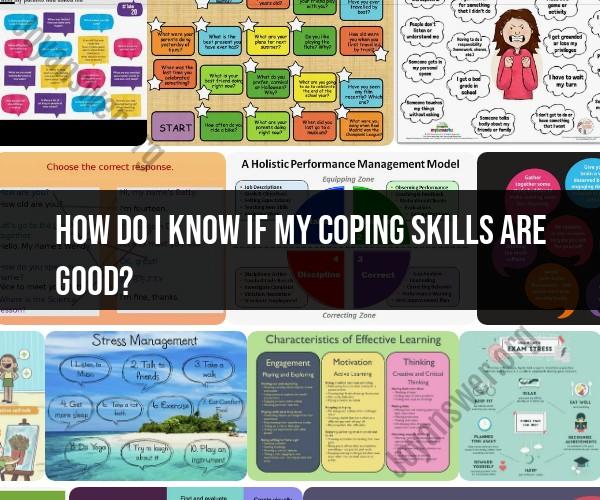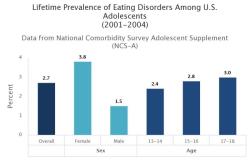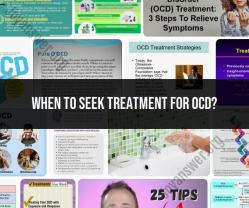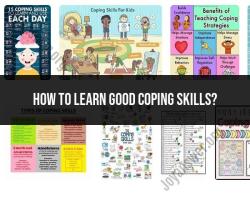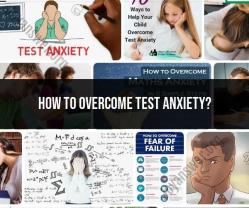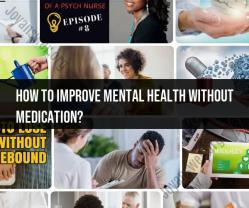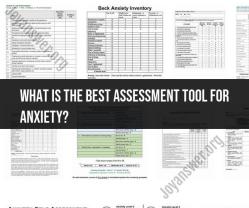How do I know if my coping skills are good?
Assessing the effectiveness of your coping skills involves evaluating how well you manage stress, adversity, and challenging situations in your life. Good coping skills help you navigate difficulties while maintaining your mental and emotional well-being. Here's a self-evaluation guide to help you determine if your coping skills are effective:
Self-Awareness:
- Do you recognize your emotional responses to stressors, such as anger, anxiety, or sadness?
- Are you aware of your coping mechanisms, both positive and negative?
Problem-Solving:
- Can you identify the root causes of your stress or problems?
- Do you actively seek solutions to address these issues, rather than avoiding or denying them?
Emotional Regulation:
- Are you able to manage intense emotions without becoming overwhelmed?
- Do you use healthy strategies to calm yourself when you're upset, such as deep breathing or mindfulness exercises?
Social Support:
- Do you reach out to friends, family, or support networks when facing difficulties?
- Are you comfortable seeking help or talking about your problems with others?
Adaptability:
- Can you adjust to changes in your life, even if they are unexpected or challenging?
- Are you open to new perspectives and willing to change your approach when necessary?
Healthy Coping Mechanisms:
- Do you engage in constructive activities or practices to cope with stress, such as exercise, hobbies, or meditation?
- Do you avoid or limit harmful coping mechanisms, such as excessive alcohol or substance use?
Time Management:
- Are you able to prioritize tasks and manage your time effectively?
- Do you avoid procrastination and tackle responsibilities in a timely manner?
Resilience:
- How do you bounce back from setbacks and failures?
- Do you view challenges as opportunities for growth rather than insurmountable obstacles?
Self-Care:
- Do you prioritize self-care activities that promote physical and emotional well-being, such as getting enough sleep, maintaining a balanced diet, and practicing relaxation techniques?
Seeking Professional Help:
- Are you open to seeking professional guidance or therapy when facing significant stress or mental health challenges?
- Do you recognize when your coping skills may not be sufficient and seek additional support?
Long-Term Outlook:
- Do you consider the long-term consequences of your actions and decisions?
- Are you making choices that align with your long-term goals and values?
Overall Well-Being:
- Do you generally feel a sense of well-being, happiness, and satisfaction in your life?
- Are you able to enjoy positive experiences and relationships?
Assessing your coping skills is an ongoing process, and it's normal to have areas where you can improve. If you find that your coping skills are not as effective as you'd like, consider seeking support from a mental health professional or counselor who can provide guidance and strategies to enhance your coping abilities. Additionally, practicing self-care, building a strong support network, and learning new coping techniques can contribute to better overall well-being and resilience in the face of life's challenges.
Assessing Your Coping Skills: How to Determine Their Effectiveness
Coping skills are the strategies you use to deal with stress and difficult emotions. They can be helpful in managing both everyday stressors and major life challenges.
There are many different types of coping skills, and what works for one person may not work for another. It is important to find coping skills that are healthy and effective for you.
To assess your coping skills, you can ask yourself the following questions:
- Do my coping skills help me to feel better?
- Do my coping skills help me to solve problems?
- Do my coping skills help me to maintain my health and well-being?
- Do my coping skills help me to cope with stress in a healthy way?
If you can answer yes to most of these questions, then your coping skills are likely to be effective. However, if you find that your coping skills are not helping you to manage stress and difficult emotions in a healthy way, then you may want to consider developing new coping skills or seeking professional help.
Coping Skills Evaluation: Are Your Strategies Effective?
Here are some additional tips for evaluating the effectiveness of your coping skills:
- Pay attention to your thoughts and feelings. When you are feeling stressed or overwhelmed, notice how you are thinking and feeling. This can help you to identify your coping mechanisms and to assess their effectiveness.
- Track your coping skills. Keep a journal or log of your coping skills and how they work for you. This can help you to identify which coping skills are most effective for you and which ones you need to work on.
- Talk to someone you trust. Talk to a friend, family member, therapist, or other trusted person about your coping skills. They can offer you support and feedback.
Building Resilience: Gauging the Quality of Your Coping Skills
Coping skills are an important part of resilience. Resilience is the ability to bounce back from adversity. People with strong coping skills are better able to manage stress and difficult emotions, and to recover from setbacks.
Here are some tips for building resilience:
- Identify your coping skills. Make a list of all the coping skills that you use. This will help you to see what coping skills you have and what coping skills you need to develop.
- Practice your coping skills. The more you practice your coping skills, the better you will become at using them. Try to practice your coping skills regularly, even when you are not feeling stressed.
- Learn new coping skills. There are many different types of coping skills, and there is no one-size-fits-all approach. Try to learn new coping skills that you can add to your toolkit.
- Seek professional help. If you are struggling to manage stress and difficult emotions on your own, seek professional help from a therapist or counselor. They can teach you new coping skills and help you to develop a resilience plan.
By assessing your coping skills and building resilience, you can better manage stress and difficult emotions. This can lead to a happier and healthier life.
